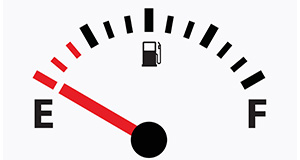
The currency of ‘busyness’ is having its moment. This frenetic, all-consuming state has somehow come to signal status, with many people wearing it like a badge of honour. And no wonder. We live in a society that glorifies overwhelm and stress. If we’re time-poor, it means we’re in high demand. If we have a packed diary, it means we’re thriving. If we’re bone-tired, it means we’re #winningatlife.
But the idea that ‘stress means success’ is no more than a modern myth. This unhealthy obsession with stretching beyond our means is costing our health. And more and more of us are now facing the ultimate twenty-first-century malaise: burnout.
We need to change this narrative. Because – as much as society tries to convince us otherwise – no one can run on empty forever.

Three types of burnout
And yet, work-related stress and professional pressures aren’t the only cause of the problem. Thanks to our modern lives humming with stress, burnout can also rear its ugly head from other angles (1).
• Individual burnout: Excessive perfectionism and negative self-talk may cause burnout. If you place unrealistic standards on yourself or believe nothing you do is good enough, you may start burning out.
• Interpersonal burnout: Challenges at work or home – especially concerning relationships – may result in burnout. For instance, a working mother who does the lion’s share of the housework and childcare (also known as ‘the second shift’) may be at the point of parental burnout.
• Organisation burnout: Extreme demands, poor organisation and impossible deadlines in the professional sphere may lead to executive burnout.
Warning signs you could be suffering from burnout
If you’re struggling with burnout or inching towards burning out, you might experience some of the following symptoms (2).

• Detachment from work-related activities: The mere thought of your job fills you with anxiety. You notice yourself becoming more frustrated and irritated by your workplace. You may also grow cynical of the people you work with and your working conditions.
• Reduced performance: You experience brain fog and struggle to concentrate. Your mind often zones out into a daze. You lack the energy needed for basic tasks. You struggle to concentrate.
• Emotional exhaustion: You feel detached from the things and people you love. You feel drained, exhausted and unable to cope. You begin to feel overwhelmed in brightly lit supermarkets and busy places.
• Physical symptoms: You experience sleep disruptions, headaches and digestive issues. You generally feel unwell and get sick often.
Reconsider your options
Burnout is often a catalyst for positive change in your life – a critical juncture that can turn adversity into opportunity. Your experience may prompt you to seriously think about your future and reconsider your job, employer, or industry. This may sound daunting at first but remember: you need to act in the best interest of your health. Whatever your decision, try to make peace of mind your priority at the moment – and fit everything else around that.
Set boundaries:
Implementing healthy boundaries at work is an essential part of burnout prevention and recovery. Taking on too many duties and engagements – especially if it’s beyond your job’s remit – can lead to overwhelm and anxiety. Before committing to something, ask yourself: do I really have the energy and time? Try to relinquish any people-pleasing tendencies; it’s not selfish or rude to decline requests or invitations. Learning to say “no” honours your health and actively prevents burnout.


Take time for yourself
Dedicate at least fifteen minutes each day to pause everything and do something wholly for you. Be selfish. Make it a non-negotiable part of your day. Communicate this need to your family, partner, and anyone else who relies on you. Choose an activity that makes you happy: listen to a podcast, buy a speciality coffee from your favourite café, potter in the garden, read, play the guitar – whatever it is, do it for yourself and don’t feel guilty about it.
Our top supplements to support Burnout
References:
-
1) Maslach, C., & Leiter, M. P. (2016). Understanding the burnout experience: recent research and its implications for psychiatry. World psychiatry: official journal of the World Psychiatric Association (WPA), 15(2), 103–111.
2) Maslach C, Leiter MP. (2016) Understanding the burnout experience: recent research and its implications for psychiatry. World Psychiatry. 15(2): 103–111.
3) DiversityQ. 2021. Burnout and work-related stress is on the rise in the UK. [ONLINE] Available at: https://diversityq.com/burnout-and-work-related-stress-is-on-the-rise-in-the-uk-1510624/
